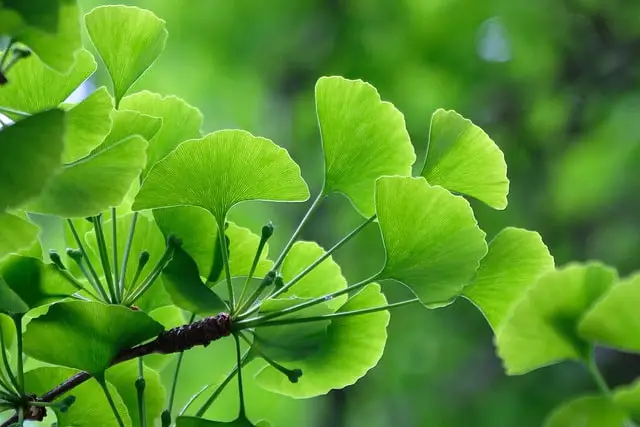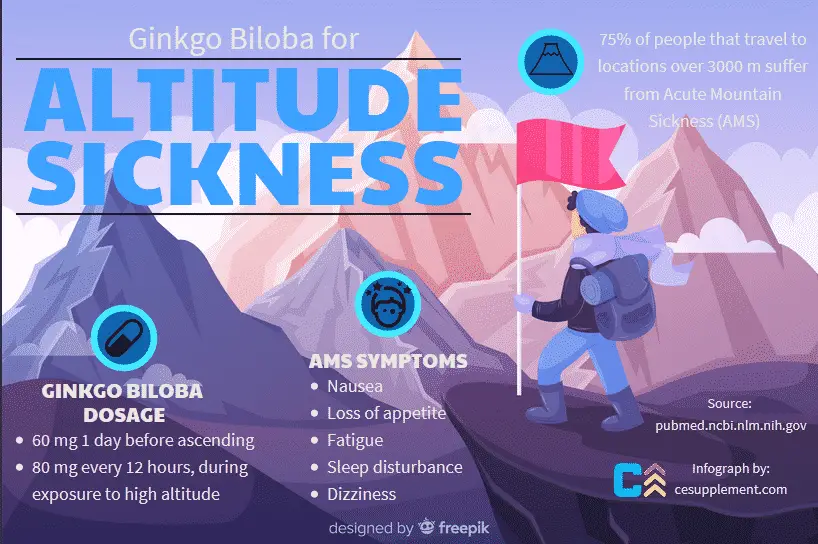Table of Contents
- Can you use Ginkgo for Altitude Sickness?
- What is the recommended dosage of Ginkgo Biloba for Altitude Sickness?
- Want To Know More?
- Sources
Can you use Ginkgo for Altitude Sickness?
You can use Ginkgo Biloba for Altitude Sickness (AMS) since it’s an antioxidant herb that helps via the following factors:
- Increased blood flow, which helps the body in low oxygen, high altitude environments
- Antioxidant properties that widen the capillary vessels and increases their blood flow output
- Decreased blood viscosity
- Brain energy metabolism regulation
This video includes a few simple suggestions that can help anyone headed to higher elevations.
This is our recommended Ginkgo Biloba supplement (Amazon’s Choice):

What is the recommended dosage of Ginkgo Biloba for Altitude Sickness?
The recommended dosage of Ginkgo Biloba for Altitude Sickness is 60 to 80mg daily in people ascending to altitudes above 2000 m.
- One day of pre-treatment with 60 mg, 24 hours before ascending.
- Maintenance with 80 mg every 12 hours, during exposure to high altitude.
Study 1
- Title: EGb 761 in control of acute mountain sickness and vascular reactivity to cold exposure.
Subject Information
- Number of Subjects: 44.
Method Used
The subjects were requested to participate in a study of the preventive effect of Ginko biloba extract (EGb 761) on acute mountain sickness (AMS) and symptoms that occur due to the constriction or dilation of blood vessels of the extremities during a Himalayan expedition. After giving their written informed consent, the subjects were randomized to two groups. One group received 160 mg of EGb 761 per day in two divided doses and the other group received placebo.
Results
The efficacy of treatment with EGb 761 was clearly demonstrated in this study. No subject in the EGb 761 group developed acute mountain sickness versus 40.9% of subjects in the placebo group; this difference was very significant. 3 subjects (13.6%) in the EGb 761 group developed acute mountain sickness versus 18 (81.8%) in the placebo group; this difference was very significant.
Conclusions
EGb 761 provides an interesting response to the prevention of mountain sickness for moderate altitude (5400 m) with gradual exposure. It also decreased symptoms that occur due to the constriction or dilation of blood vessels of the extremities.
Study 2
- Title: Ginkgo biloba does–and does not–prevent acute mountain sickness.
Subject Information
- Number of Subjects: 40 for the first study, 37 for the second study.
Method Used
Two studies were conducted in which participants were treated with Gingko Biloba Extract (240 mg) or placebo prior to and including the day of ascent from 1600 m to 4300 m (ascent in 2 hours by car).
Results
Results were conflicting: Ginkgo biloba reduced the incidence and severity of AMS compared to placebo in the first but not the second study.
In the first study, Gingko Biloba Extract reduced AMS incidence vs placebo, and it also reduced severity.
In the second study, Gingko Biloba Extract did not reduce incidence or severity of AMS (Gingko Biloba Extract vs placebo). The primary difference between the 2 studies was the source of Gingko Biloba Extract.
Conclusions
The source and composition of Gingko Biloba Extract products may determine the effectiveness of Gingko Biloba Extract for prophylaxis of AMS.

Study 1
- Title: Ginkgo biloba for the prevention of severe acute mountain sickness (AMS) starting one day before rapid ascent.
- Length: 5 days.
Subject Information
- Number of subjects: 26.
- Subject distribution: 12 on Ginkgo group 14 on placebo group.
- Median age: 28yr on Ginko group vs. 33yr on placebo group.
- Age range: 22-53yr on Ginko group vs. 21-53yr on placebo group
- Race: 58% Caucasian on Ginko group vs. 57% Caucasian on placebo group.
- Gender: 58% female on Ginko group vs. 50% female on placebo group.
Method Used
Previous studies suggest that 5 days of ginkgo consumption decreases the incidence of acute mountain sickness (AMS) during gradual ascent. This trial was designed to determine if ginkgo is an effective agent if begun 1 day prior to rapid ascent. In this trial, participants residing at sea level received ginkgo (60 mg) or placebo starting 24 h before ascending Mauna Kea, Hawaii. Subjects were transported from sea level to the summit (4205 m) over 3 hours, including 1 hour at 2835 m. Subjects who developed severe AMS were promptly transported to lower altitude for the remainder of the study.
Results
Two (17% of the 12 patients consuming Ginkgo) and nine (64% of the 14 patients on placebo) developed severe AMS and required descent for their safety; all recovered without sequels. Symptoms at 4205 m were significantly lower for ginkgo versus placebo. Ginkgo use did not reach statistical significance for lowering incidence of AMS compared with placebo. 21 out of 26 (81% of the subjects) developed AMS overall.
Conclusions
This is the first study to demonstrate that 1 day of pretreatment with ginkgo 60 mg may significantly reduce the severity of AMS prior to rapid ascent from sea level to 4205 m.
Study 2
- Title: Ginkgo biloba decreases acute mountain sickness in people ascending to high altitude at Ollagüe (3696 m) in northern Chile.
- Length: 1 day.
Subject Information
- Number of Subjects: 36.
Method Used
Participants that originally reside at sea level were transported to an altitude of 3696 m (Ollagüe mountain).
The participants were divided into 3 groups:
- 12 participants received 80 mg of Ginkgo biloba every 12 hours.
- 12 participants received 250 mg of acetazolamide every 12 hours.
- 12 participants received placebo.
Participants received these dosages 24 hours before ascending and during their 3-day stay at high altitude (3696 m). Oxygen saturation, heart rate, and arterial pressure were taken with each evaluation for AMS.
Results
A significant reduction in AMS was observed in the group that received Ginkgo biloba compared with the groups receiving acetazolamide or placebo. No difference was observed in arterial oxygen saturation in the Ginkgo biloba vs the acetazolamide groups. However, a marked increased level of oxygen was seen in comparison with the placebo group. No statistically significant differences were observed in mean arterial pressure or heart rate.
Conclusions
This study provides evidence supporting the use of Gingko biloba in the prevention of AMS, demonstrating that 24 hours of pretreatment with Ginkgo biloba and subsequent maintenance during exposure to high altitude are sufficient to reduce the incidence of AMS in participants with no previous high-altitude experience.
Want To Know More?
Click the links below to access the individual topic pages:
Sources
This article makes use of information from the U.S. National Library of Medicine under the terms of the Creative Commons Attribution 4.0 International License.
- Roncin JP, Schwartz F, D’Arbigny P. EGb 761 in control of acute mountain sickness and vascular reactivity to cold exposure. Aviat Space Environ Med. 1996;67(5):445-452.
- Moraga FA, Flores A, Serra J, Esnaola C, Barriento C. Ginkgo biloba decreases acute mountain sickness in people ascending to high altitude at Ollagüe (3696 m) in northern Chile [published correction appears in Wilderness Environ Med. 2008 Spring;19(1):51]. Wilderness Environ Med. 2007;18(4):251-257. doi:10.1580/06-WEME-OR-062R2.1/
- Leadbetter G, Keyes LE, Maakestad KM, Olson S, Tissot van Patot MC, Hackett PH. Ginkgo biloba does–and does not–prevent acute mountain sickness. Wilderness Environ Med. 2009;20(1):66-71. doi:10.1580/08-WEME-BR-247.1
- Gertsch JH, Seto TB, Mor J, Onopa J. Ginkgo biloba for the prevention of severe acute mountain sickness (AMS) starting one day before rapid ascent. High Alt Med Biol. 2002;3(1):29-37. doi:10.1089/152702902753639522
- Prince TS, Thurman J, Huebner K. Acute Mountain Sickness. [Updated 2020 Jul 17]. In: StatPearls [Internet]. Treasure Island (FL): StatPearls Publishing; 2020 Jan-. Available from: https://www.ncbi.nlm.nih.gov/books/NBK430716/

